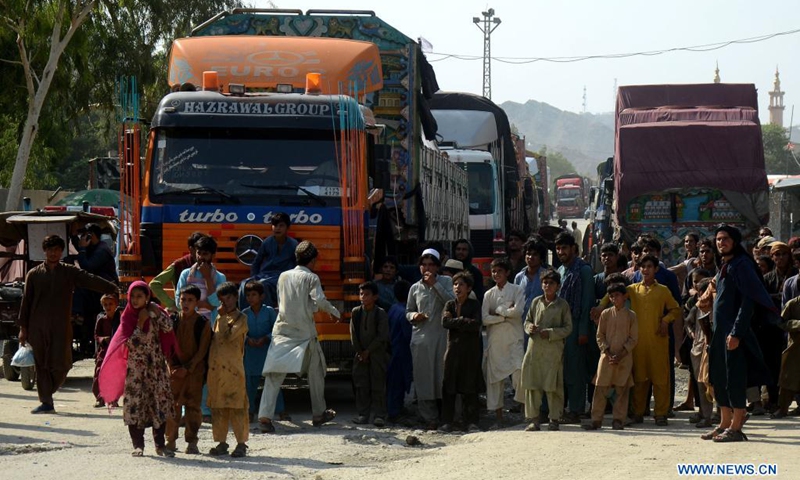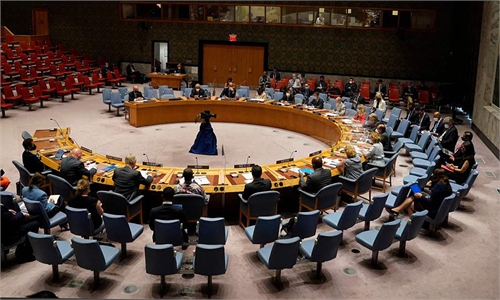China’s agricultural expertise could help Afghanistan once conditions permit: insiders

Photo taken in northwestern Pakistan's Torkham on Aug. 22, 2021 shows trucks waiting to cross the border at a border crossing between Pakistan and Afghanistan.(Photo: Xinhua)
Chinese experts and businesses are looking at the possibilities for applying China's capabilities and expertise in the agricultural sector in Afghanistan to help the war-torn country develop its currently backward agricultural sector, which is a pillar to the country's economic and social development.
Some industry insiders noted that China's extensive experience in developing alternative farming could come into play, after the Afghan Taliban banned opium production and seeks to develop traditional farming, though profound uncertainties remain in areas such as security and policy.
A source in a representative office in the Chinatown of Afghanistan surnamed Gao told the Global Times on Tuesday that the company has started looking into opportunities for agricultural cooperation, including talks with former officials in the agricultural sector to discuss how Chinese companies can take part.
"China can make a difference in irrigation, seed development, pest control, fertilization and personnel training in Afghanistan," Gao said, noting that Chinatown already works with farmers in the seed industry.
There is also potential in fruit tree grafting and agricultural machinery-assisted production when safety conditions are met, according to Gao.
Agriculture and animal husbandry are the pillars of Afghanistan's economy. A report by the UN Country Team in Afghanistan said that about 70-80 percent of Afghans rely on agriculture, animal husbandry and artisanal mining for a living.
However, the technology and levels of agricultural cultivation in Afghanistan are similar to China in the 1960s, when the country lacks modern and high-tech facilities. Food shortages mean that the country needs international aid or food imports every year.
Opium cultivation in Afghanistan covered 224,000 hectares in 2020, an increase of 37 percent from 2019, under the US-backed government, according to media reports. The country produced 6,300 tons of opium, accounting for about 85 percent of the world's supply.
The Taliban's ban on poppy cultivation is a good signal for agricultural development in the country, experts said, and there is potential for cooperation with Chinese companies in the process of agricultural transformation, once the political and security situation stabilizes.
Peng Lihua, general manager of Xishuangbanna Lihua Fruit Co, who has many years of experience in alternative plantations to replace opium in Myanmar, believes that these successful examples could work in other countries, including Afghanistan, if the conditions are right.
As part of China's bilateral investment projects, joint alternative plantations have greatly changed the agricultural patterns in some areas that were devastated by opium cultivation and drug trafficking, experts noted.
The project, in joint efforts with the Myanmar authorities, has solved unemployment problems and increased farmers' incomes.
"Local farmers are raising crops like bananas instead opium, and their annual incomes have jumped from around 40,000 to 90,000 yuan ($13,932), much more than when they planted opium," said Peng, noting that they were also building schools.
Alternative development projects are abundant in Myanmar and Laos, with more than a dozen Chinese projects - a successful example of agricultural investment overseas, official data showed.
"If there is a need for us to go to Afghanistan to develop alternative farming, we would definitely like to be involved, with our investment and technology," said Peng.
While the potential for agricultural cooperation is huge in Afghanistan, industry insiders said that there are conditions yet to be met.
Afghanistan's political instability has long deterred companies from investing there, Zhai Xueling, director of the Market and Trade Research Office at the Ministry of Agriculture and Rural Affairs of China, told the Global Times on Tuesday.
Alternative planting is supported by foreign investment, which requires a comprehensive analysis of the investment environment. But Zhai noted that if there is potential for investment, companies are likely to go.



